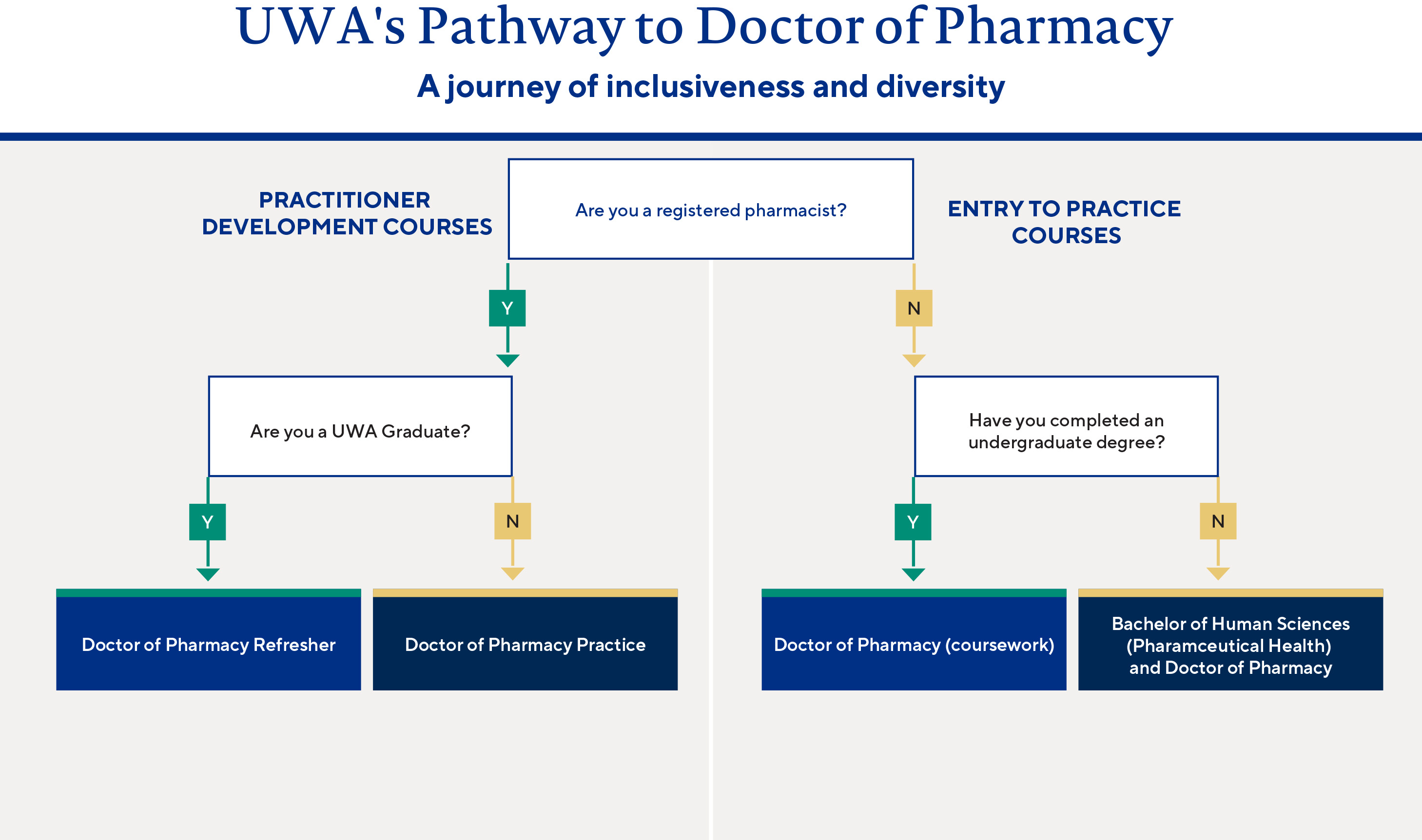Undergraduate + Postgraduate
Bachelor of Human Sciences (Pharmaceutical Health) and Doctor of Pharmacy
Contact us
Address
Student Central
The University of Western Australia (M355), 35 Stirling Highway, Perth, Western Australia 6009
Telephone
131 UWA (131 892)
International
(+61 8) 6488 1000
Hours
Frequently asked questions
Events you may be interested in
Show more eventsCareers and further study
This course opens up a world of future study pathways and career opportunities.
Career opportunities
Fees and scholarships
Scholarships
Scholarships are available to students from a diverse range of backgrounds, including academic achievement, financial need, educational disadvantage, leadership and community service, artistic or sporting achievements, and being from a rural or remote area.
Cost of living
International Student Fees
Onshore international students are charged an annual course fee, charged per credit point at a rate dependent on the course in which the student is enrolled. Annual course fees are calculated based on an annual study load. Check the handbook to confirm the annual study load for your course.
Find out more about international student tuition fees and visit the fee calculator for the relevant course fees.
Fees are subject to annual indexation.
Scholarships
Scholarships are available to students from a diverse range of backgrounds, including academic achievement, financial need, educational disadvantage, leadership and community service, artistic or sporting achievements, and being from a rural or remote area.
Cost of living
Admission requirements
The University of Western Australia welcomes applications from international and domestic school-leavers. If you’re interested in studying one of these majors, find out the admission details below.
Minimum entry requirements
- 12.5
- 10
- 82.5
- 288
- 329
- 320
- 70
- 1220
- 64
- 85
Admission requirements
English competency
English is the language of instruction and assessment at UWA and you will need to meet the English language requirements of the University to be eligible for a place.
Minimum overall IELTS score of 7.0, with no band less than 7.0.
How to apply

Ready for the next step?
Find out how to apply through our simple online application process.
We'll guide you through our entry requirements, admission pathways available to you and application deadlines for your chosen course.
We can’t wait for you to join us!
Course details
The Bachelor of Human Sciences (Pharmaceutical Health) and Doctor of Pharmacy is a four-year program, designed for you to excel as a pharmacist, highlighting the critical role pharmacists play as frontline healthcare providers and equipping you for the expanding scope of practice across diverse healthcare settings and specialised fields.
About the course
Quick details
- Available
- 85
- Semester 1
- 4 years full time
- CM039
- 116859G
- Undergraduate + postgraduate
- Perth (Crawley campus)
Why study this course
- Finish your studies in a four-year timeframe, earning not just one but two degrees. This distinctive accomplishment sets you apart in the job market, offering a competitive edge as you embark on your career journey post-graduation.
- Gain practical experience through simulated learning, guided by clinical tutors to develop essential clinical and patient-care skills.
- You'll develop knowledge about medicines and the human skills so essential for healthcare professionals who care for others.
- This course was designed with a contemporary future-focused curriculum to equip you with the advanced knowledge and human skills necessary for the evolving pharmacy and healthcare landscape.
Course accreditation

The Doctor of Pharmacy is accredited by the Australian Pharmacy Council (APC) and is approved by the Pharmacy Board of Australia as a qualification leading to registration as a pharmacist in Australia.
You'll learn to
- Develop exceptional communication and empathy skills to engage effectively with patients, caregivers, and healthcare professionals—ensuring clarity, compassion, and cultural sensitivity in every interaction.
- Build a deep understanding of pharmaceutical sciences and clinical practice, enabling you to interpret data, evaluate evidence, and make informed decisions that improve patient outcomes.
- Gain hands-on experience from your first patient interaction, applying your knowledge in real-world healthcare settings and developing confidence in clinical environments.
- Learn from leading experts in pharmacy practice and research, staying at the forefront of innovations in medication management, therapeutics, and patient care.
- Design and conduct rigorous scientific research, equipping you with the skills to critically evaluate studies, contribute to evidence-based practice, and pursue further academic or research-based postgraduate opportunities.







 Bachelor of Human Sciences
Bachelor of Human Sciences